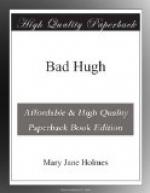Some one might lose their way on that terrible night, he said, and the blaze of the fire on the hearth, which could be seen from afar, would be to them a beacon light to guide them on their way. Nobody would look in upon them, as Adaline, or ’Lina as she chose to be called, and as all did call her except himself, seemed to think there might, and even if they did, why need she care? To be sure she was not quite as fixey as she was on pleasant days when there was a possibility of visitors, and her cheeks were not quite so red, but she was looking well enough, and she’d undone all those little tags or braids which disfigured her so shockingly in the morning, but which, when brushed and carefully arranged, did give her hair that waving appearance she so much desired. As for himself, he never meant to do anything of which he was ashamed, so he did not care how many were watching him through the window, and stamping his heavy boots upon the rug, for he had just come in from the storm Hugh Worthington piled fresh fuel upon the fire, and, shaking back the mass of short brown curls which had fallen upon his forehead, strode across the room and arranged the shades to his own liking, paying no heed when his more fastidious sister, with a frown upon her dark, handsome face, muttered something about the “Stanley taste.”
“There, Kelpie, lie there,” he continued, returning to the hearth, and, addressing a small, white, shaggy dog, which, with a human look in its round, pink eyes, obeyed the voice it knew and loved, and crouched down in the corner at a safe distance from the young lady, whom it seemed instinctively to know as an enemy.
“Do, pray, Hugh, let the dirty things stay where they are,” ’Lina exclaimed, as she saw her brother walk toward the dining-room, and guessed his errand. “Nobody wants a pack of dogs under their feet. I wonder you don’t bring in your pet horse, saddle and all.”
“I did want to when I heard how piteously he cried after me as I left the stable to-night,” said Hugh, at the same time opening a door leading out upon a back piazza, and, uttering a peculiar whistle, which brought around him at once the pack of dogs which so annoyed his sister.
“I’d be a savage altogether if I were you!” was the sister’s angry remark, to which Hugh paid no heed.
It was his house, his fire, and if he chose to have his dogs there, he should, for all of Ad, but when the pale, gentle-looking woman, knitting so quietly in her accustomed chair, looked up and said imploringly:
“Please turn them into the kitchen, they’ll surely be comfortable there,” he yielded at once, for that pale, gentle woman, was his mother, and, to her wishes, Hugh was generally obedient.




